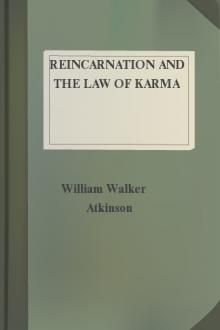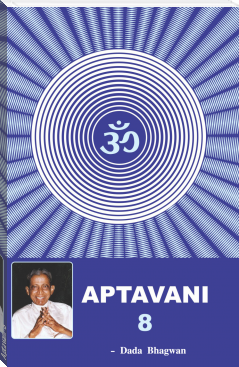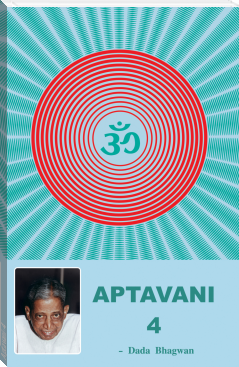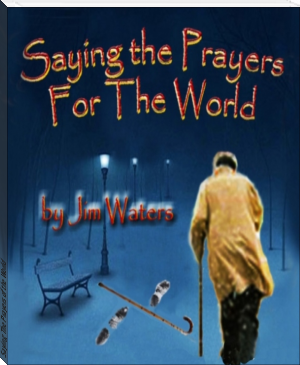Reincarnation and the Law of Karma - William Walker Atkinson (pocket ebook reader .txt) 📗

- Author: William Walker Atkinson
- Performer: -
Book online «Reincarnation and the Law of Karma - William Walker Atkinson (pocket ebook reader .txt) 📗». Author William Walker Atkinson
A recent writer along the lines of Oriental Philosophy has said regarding this common experience of the race: "Many people have had 'peculiar experiences' that are accountable only upon the hypothesis of Metempsychosis. Who has not experienced the consciousness of having felt the thing before—having thought it some time in the dim past? Who has not witnessed new scenes that appear old, very old? Who has not met persons for the first time, whose presence awakened memories of a past lying far back in the misty ages of long ago? Who has not been seized at times with the consciousness of a mighty 'oldness' of soul? Who has not heard music, often entirely new compositions, which somehow awakened memories of similar strains, scenes, places, faces, voices, lands, associations, and events, sounding dimly on the strings of memory as the breezes of the harmony floats over them? Who has not gazed at some old painting, or piece of statuary, with the sense of having seen it all before? Who has not lived through events which brought with them a certainty of being merely a repetition of some shadowy occurrences away back in lives lived long ago? Who has not felt the influence of the mountain, the sea, the desert, coming to them when they are far from such scenes—coming so vividly as to cause the actual scene of the present to fade into comparative unreality? Who has not had these experiences?"
We have been informed by Hindus well advanced in the occult theory and practice that it is quite a common thing for people of their country to awaken to an almost complete recollection of their former lives; in some cases they have related details of former lives that have been fully verified by investigation in parts of the land very remote from their present residence. In one case, a Hindu sage related to us an instance where a poor Hindu, who had worked steadily in the village in which he had been born, without leaving it, ever since his childhood days. This man one day cried out that he had awakened to a recollection of having been a man of such and such a village, in a province hundreds of miles from his home. Some wealthy people became interested in the matter, and after having taken down his statements in writing, and after careful examination and questioning, they took him to the town in question. Upon entering the village the man seemed dazed, and cried out: "Everything is changed—it is the same and yet not the same!" Finally, however, he began to recognize some of the old landmarks of the place, and to call the places and roads by their names. Then, coming to a familiar corner, he cried: "Down there is my old home," and, rushing down the road for several hundred yards, he finally stopped before the ruins of an old cottage, and burst into tears, saying that the roof of his home had fallen in, and the walls were crumbling to pieces. Inquiry among the oldest men of the place brought to light the fact that when these aged men were boys, the house had been occupied by an old man, bearing the same name first mentioned by the Hindu as having been his own in his previous life. Other facts about the former location of places in the village were verified by the old men. Finally, while walking around the ruins, the man said: "There should be a pot of silver buried there—I hid it there when I lived here." The people rapidly uncovered the ground indicated, and brought to light an old pot containing a few pieces of silver coin of a date corresponding to the lifetime of the former occupant of the house. Our informant told us that he had personal knowledge of a number of similar cases, none of which, however, were quite as complete in detail as the one mentioned. He also informed us that he himself, and a number of his acquaintances who had attained certain degrees of occult unfoldment, were fully aware of their past lives for several incarnations back.
Another instance came under our personal observation, in which an American who had never been to India, when taken into a room in which a Hindu priest who was visiting America had erected a shrine or altar before which he performed his religious services, readily recognized the arrangement of the details of worship, ritual, ceremony, etc., and was conscious of having seen, or at least dreamed of seeing, a similar shrine at some time in the past, and as having had some connection with the same. The Hindu priest, upon hearing the American's remarks, stated that his knowledge of the details of the shrine, as then expressed, indicated a knowledge possible only to one who had served at a Hindu altar in some capacity.
We know of another case in which an acquaintance, a prominent attorney in the West, told us that when undergoing his initiation in the Masonic order he had a full recollection of having undergone the same before, and he actually anticipated each successive step. This knowledge, however, ceased after he had passed beyond the first three degrees which took him to the place where he was a full Master Mason, the higher degrees being entirely new to him, and having been apparently not experienced before. This man was not a believer in any doctrine of Reincarnation, and related the incident merely as "one of those things that no man can explain."
We know of another case, in which a student of Hindu Philosophy and Oriental Occultism found that he could anticipate each step of the teaching and doctrine, and each bit of knowledge gained by him seemed merely a recollection of something known long since. So true was this that he was able to supply the "missing links" of the teaching, where he had not access to the proper sources of information at the time, and in each case he afterward found that he had stated the same correctly. And this included many points of the Inner Teachings not generally taught to the general public, but reserved for the few. Subsequent contact with native Hindu teachers brought to light the fact that he had already unraveled many tangled skeins of doctrine deemed possible only to the "elect."
Many of these recollections of the past come as if they were memories of something experienced in dreams, but sometimes after the loose end of the thought is firmly grasped and mentally drawn out, other bits of recollection will follow. Sir Walter Scott wrote in his diary in 1828: "I was strangely haunted by what I would call the sense of pre-existence, viz., a confused idea that nothing that passed was said for the first time; that the same topics had been discussed, and the same persons had stated the same opinions on them." William Home, an English writer, was instantly converted from materialism to a belief in a spiritual existence by an incident that occurred to him in a part of London utterly strange to him. He entered a waiting room, and to his surprise everything seemed familiar to him. As he says: "I seemed to recognize every object. I said to myself, what is this? I have never been here before, and yet I have seen all this, and if so, there is a very peculiar knot in that shutter." He then crossed the room, and opened the shutter, and after examination he saw the identical peculiar knot that he had felt sure was there. Pythagoras is said to have distinctly remembered a number of his previous incarnations, and at one time pointed out a shield in a Grecian temple as having been carried by him in a previous incarnation at the siege of Troy. A well-known ancient Hindu sage is said to have transcribed a lost sacred book of doctrine from memory of its study in a previous life. Children often talk strangely of former lives, which ideas, however, are generally frightened out of them by reproof on the part of parents, and often punishment for untruthfulness and romancing. As they grow older these memories fade away.
People traveling in strange places often experience emotion when viewing some particular scene, and memory seems to painfully struggle to bring into the field of consciousness the former connection between the scene and the individual. Many persons have testified to these occurrences, many of them being matter-of-fact, unimaginative people, who had never even heard of the doctrine of Reincarnation. Charles Dickens, in one of his books of foreign travel, tells of a bridge in Italy which produced a peculiar effect upon him. He says: "If I had been murdered there in some former life, I could not have seemed to remember the place more thoroughly, or with more emphatic chilling of the blood; and the real remembrance of it acquired in that minute is so strengthened by the imaginary recollection that I hardly think I could forget it." Another recorded instance is that of a person entering a foreign library for the first time. Passing to the department of ancient books, he said that he had a dim idea that a certain rare book was to be found on such a shelf, in such a corner, describing at the same time certain peculiarities of the volume. A search failed to discover the volume in the stated place, but investigation showed that it was in another place in the library, and an old assistant stated that a generation back it had been moved from its former place (as stated by the visitor), where it had been previously located for very many years. An examination of the volume showed a perfect correspondence in every detail with the description of the strange visitor.
And so the story proceeds. Reference to the many works written on the subject of the future life of the soul will supply many more instances of the glimpses of recollection of past incarnations. But why spread these instances over more pages? The experience of other people, while of scientific interest and value as affording a basis for a theory or doctrine, will never supply the experience that the close and rigid investigator demands. Only his own experiences will satisfy him—and perhaps not even those, for he may consider them delusions. These experiences of others have their principal value as corroborative proofs of one's own experiences, and thus serve to prove that the individual experience was not abnormal, unusual, or a delusion. To those who have not had these glimpses of recollection, the only proof that can be offered is the usual arguments in favor of the doctrine, and the account of the experiences of others—this may satisfy, and may not. But to those who have had these glimpses—particularly in a marked degree—there will come a feeling of certainty and conviction that in some cases is as real as the certainty and conviction of the present existence, and which will be proof against all argument to the contrary. To such people the knowledge of previous existences is as much a matter of consciousness as the fact of the existence of last year—yesterday—a moment ago—or even the present moment, which slips away while we attempt to consider it. And those who have this consciousness of past lives, even though the details may be vague, intuitively accept the teachings regarding the future lives of the soul. The soul that recognizes its "oldness" also feels its certainty





Comments (0)